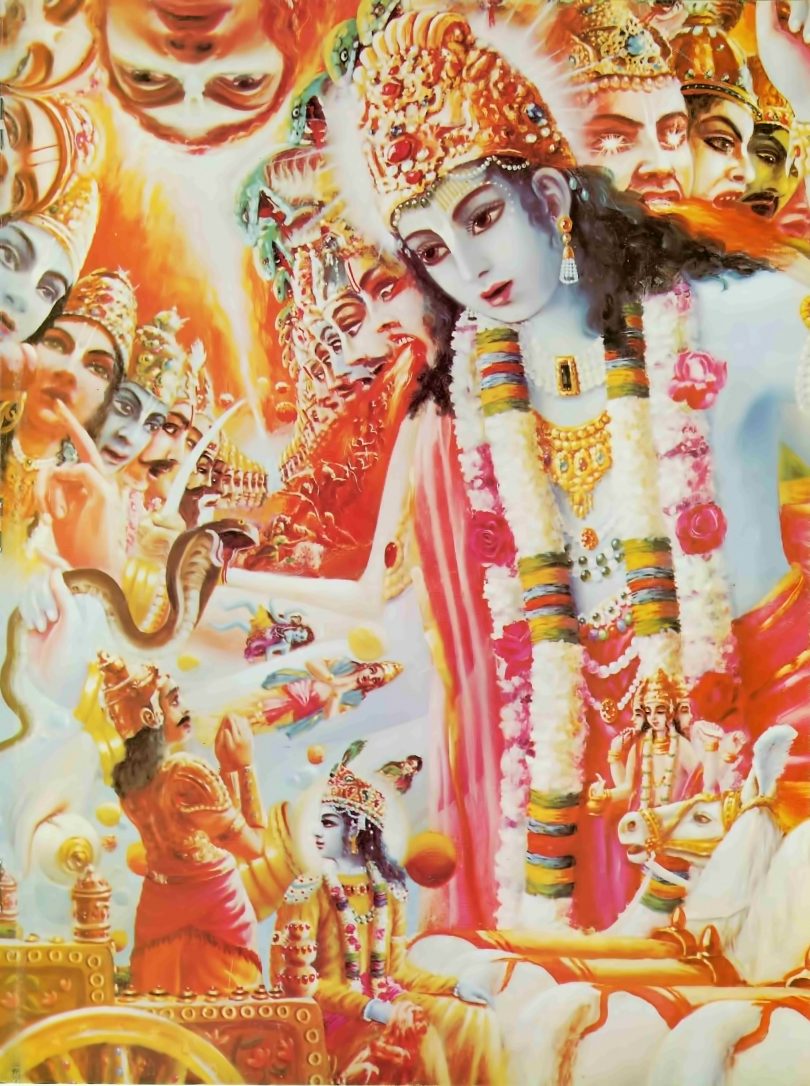Q. In Bhagavad-Gita 11.20, Arjuna describes that he sees all the planetary systems perplexed before the universal form of the Lord. In the purport, Srila Prabhupada states:
“Dyav-aprthivyoh (the space between heaven and earth) and loka-trayam (the three worlds) are significant words in this verse because it appears that not only Arjuna saw this universal form of the Lord, but others in other planetary systems also saw it. The vision was not a dream. All who were spiritually awake with the divine vision saw it.”
In 11.22, Arjuna describes further that he sees beings on many different planets beholding the Lord in wonder, including the Asuras. Then much later in 11.48 Srila Prabhupada describes in the purport: “Unless one attains the status of divinity as a demigod, he cannot have divine vision. And what is a demigod? It is stated in the Vedic scriptures that those who are devotees of Lord Vishnu are demigods. Those who are atheistic, i.e., who do not believe in Vishnu, or who only recognize the impersonal part of Krsna as the Supreme, cannot have the divine vision.”
It is a seeming contradiction that initially in 11.20, Srila Prabhupada states that those with divine vision are able to see this form of the Lord, two verses later it’s described that the Asuras saw it, and then later it’s more emphatically stated by Prabhupada that those who aren’t devotees of Vishnu cannot have the divine vision. Can you therefore please provide a deeper understanding what’s really going on in these verses? Is this Asura different than the simple definition of “asura?”
Answer by Romapada Swami: Whoever the Lord endowed with divine vision saw the universal form. And this included some who belonged to the ‘Asura’ class also.
The definition of deva and asura given by Prabhupada is directly derived from Padma purana:
dvau bhuta-sargau loke ‘smin
daiva asura eva ca
vishnu-bhakta smrito daiva
asuras tad viparyayah
“There are two classes of men in the created world. One consists of the demoniac and the other of the godly. The devotees of Lord Vishnu are the godly (daiva), and those who are against the Lord, are the ungodly (asura).”
Although this is the original meaning of the term, yet in common usage within Vedic literature, those appearing in demoniac families are also sometimes referred to as asuras, even though by quality they may be favorably inclined towards the Supreme Lord. Prahlada is often referred to as ‘the best among the demons’. Even Krishna says, “Among the Daitya demons, I am the devoted Prahlada.” (BG 10.30) Similarly, Bali Maharaja can technically be addressed as an asura, although he is one of the mahajanas and is known to be residing in the Sutala planet. Although these particular personalities are not mentioned in the context of seeing the Universal form, we can understand that many highly qualified personalities from all over the universe, including some of the “best among the Asuras”, were favored by the Lord with the divine vision.
As stressed throughout this chapter, Srila Prabhupada’s emphasis here is that only those whom Krishna mercifully gives the power can see this Universal form; and the Lord favors those who are devotees, not the atheists and demoniac who defy His authority.
Yet, Krishna did reveal a partial feature of His universal form once to Duryodhana previously (not this form that was shown before Arjuna on the battlefield, for which Duryodhana had no access, but a partial aspect of it); in spite of this, Duryodhana could not appreciate Krishna’s divinity and dismissed it simply as a mystical trick. In that sense it can be said that he did not see the Lord even while beholding Him.
Similar statements can be made about many asuras before whom Krishna appeared in His original form, but they saw Him merely as an ordinary human and as an enemy. Thus only those who are devoted can actually have the vision to perceive the Form of the Lord as it is.







